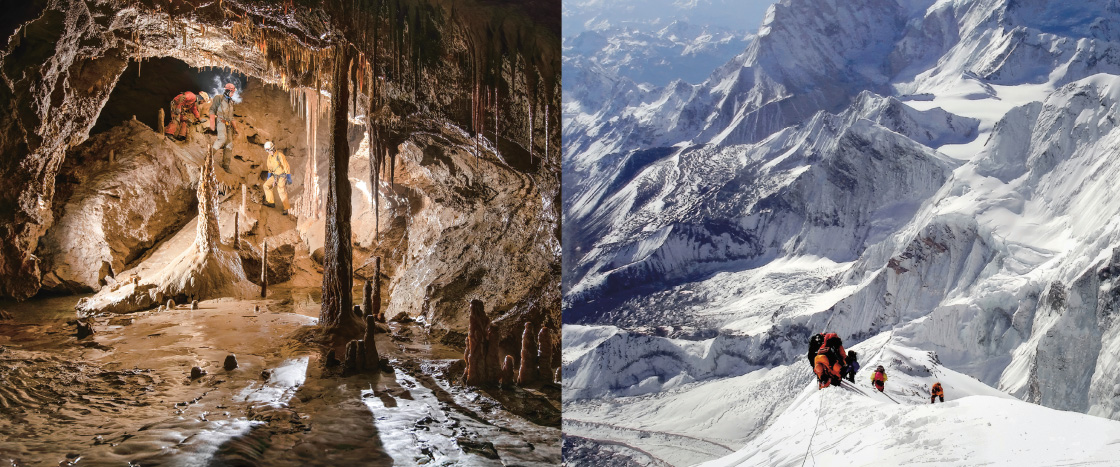Deep under the earth, the crystal-lined walls of Veryovkina (veh-ryohv-KEE-nuh) Cave wait to be explored. Mount Everest soars into the sky, its stunning views earning it the nickname “Rooftop of the World.” Both locations are very dangerous! If you had to choose, which of our planet’s extremes would you dare to visit?

Would You Rather Explore the Deepest Cave or Climb the Tallest Mountain?
Which of our planet's extremes would you dare to visit?
Learning Objective: Students will gather and use information about cave diving and mountain climbing to support an argument.
Standards
SAFETY CHECK! This question is fun to think about, but caving and mountaineering are dangerous. Never do these activities without a trusted adult.
EXPLORE THE DEEPEST CAVE
Robbie Shone/Design Pics/Aflo Images
At more than a mile in depth, Veryovkina Cave is believed to be the deepest cave in the world!
BEFORE YOU GO
Jim McMahon/Mapman®
Exploring Veryovkina Cave means trekking as deep as 7,257 feet (2,212 meters) underground. A full trip takes a week, even for professionals! You’ll need to travel with experienced cavers and learn skills like crawling through tight spaces and scaling cave walls.
PACKING LIST
Cavers need to wear warm clothes, sturdy boots, thick gloves, and a headlamp to tackle Veryovkina. You’ll also need a backpack to carry camping equipment. Other essentials for your trip? A first aid kit, extra batteries, climbing ropes, and a lot of food and water.
POSSIBLE DANGERS
All caves can be unpredictable. Falling rocks and narrow tunnels can trap cavers. Water can surge into tunnels during storms. To date, two people have died in Veryovkina.
WHAT IT WOULD BE LIKE
Veryovkina’s entrance is a small opening in the ground. You drop down using a harness and ropes until you find yourself in a giant pit. The only light is from your headlamp. As you explore, you spot ghostly white cave shrimp and eyeless insects. The passage narrows into a cold, damp tunnel. After you shimmy through, you discover a turquoise lake surrounded by jet-black limestone. Thick, icicle-like rock formations called stalactites hang above you. Take it all in—because now you have to go back up!
CLIMB THE TALLEST MOUNTAIN
robertharding/Alamy Stock Photo
In Nepal, Mount Everest is called Sagarmatha. It goes by the name Chomolungma in Tibet.
BEFORE YOU GO
Jim McMahon/Mapman®
Climbing Mount Everest takes almost a month of uphill travel. You’ll need to train for months or even years to climb the 80-mile (129 kilometer) trail with a 33-pound (15 kilogram) backpack full of gear. Finding a guide who’s familiar with Everest’s paths is key to getting to the top.
PACKING LIST
To reach Everest’s peak, you’ll need camping gear like tents and sleeping bags. Bring goggles and a helmet for protection. An ice ax and spiked devices for your boots called crampons will help you climb up ice and snow.
POSSIBLE DANGERS
The air is so thin on Everest, climbing too fast can make you sick. You could also face snowstorms and strong winds! More than 340 climbers have died attempting to reach the top.
WHAT IT WOULD BE LIKE
The start of your trip is at a base camp in the Himalayan mountains, sitting at more than 3 miles (about 5 km) above sea level. As you go higher, you use ropes to pull yourself up cliffs and glaciers. Each day, you’ll start hiking before sunrise. You’ll likely spend as long as six to eight hours a day slowly climbing upward through freezing wind with a heavy pack on your back. When you reach the snowy peak, the miles of landscape below will look tiny. You’ll be seeing the world from a height few ever reach—but now you must head back down.
Which would you rather explore?
Which would you rather explore?
Which would you rather explore?

